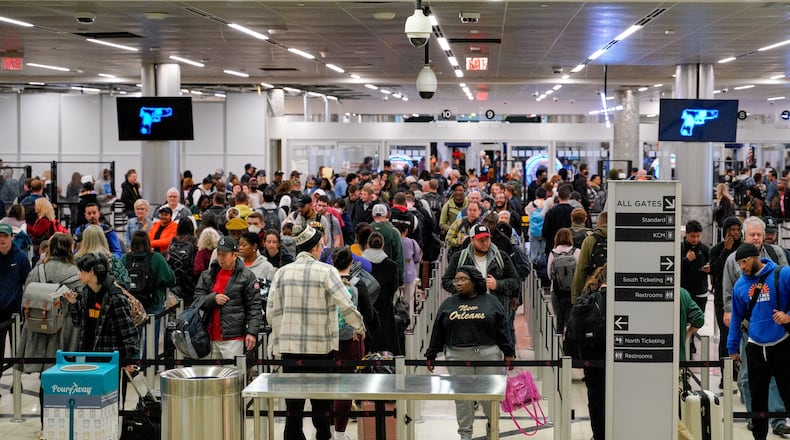Hartsfield-Jackson International Airport is testing a “virtual queue” system to allow some travelers to get into an expedited line for security screening — but only if they park at certain airport-run park-ride lots.
The 90-day pilot program is another attempt at offering travelers a way to sidestep long lines at security checkpoints, which have have caused frustrations during peak periods at the world’s busiest airport.
Many of the other choices to skip the line — such as Clear or TSA PreCheck — require a fee or other special access, and have become so popular that members still face lengthy waits.
Hartsfield-Jackson says its virtual queue with an expedited path to security is free for domestic travelers who pay to use its Park-Ride Lot C and ATL Select lot.
That makes it an option for some to avoid long security waits, especially those without trusted traveler memberships who might normally pass through standard screening at the main checkpoint.
The ATL Virtual Queue parking program calls for those who park at the ATL Select or Park-Ride Lot C to board the parking shuttle and scan a QR code on a poster to join the virtual queue. The security line reservation through vendor Qtrac can only be made on the same day of a flight.
After checking any bags, travelers go to the airport’s domestic terminal information desk to show they have a ticket from the parking shuttle and confirm their security line reservation.
Then, a customer service representative escorts the traveler to an expedited security line at one of the airport’s checkpoints, including for PreCheck, said Steve Mayers, Hartsfield-Jackson’s assistant general manager of marketing and customer experience.
When the virtual queue system first launched, it required that people get to the airport at least two hours early. But Mayers said “we have been playing with lessening that time.” Travelers can now get a security line reservation 20 minutes away, according to the airport.
The airport’s motivation for testing the virtual queue program came with the closure of the airport’s South Economy parking lot, which has caused airport parking shortages.
Mayers said airport officials wanted to find a way to incentivize travelers to still use airport parking, one of Hartsfield-Jackson’s biggest revenue streams.
It may be too early to assess how well it will work. Since the announcement of the launch earlier this month, the program had been used by only about 30 people by the middle of this week.
One factor that may affect usage of the virtual queue is the shortage of airport parking during busy periods, which has meant many travelers make parking reservations to ensure a spot before their trip. The ATL Select lot offers parking reservations, but Park-Ride Lot C lot does not. Even at the ATL Select lot, reservations aren’t always available.
The virtual queue is not available to those who use the airport’s daily or economy parking, nor for those who park at the ATL West parking deck — which don’t require shuttle service. It’s also not available at the international terminal parking decks.
The Transportation Research Board this month said it plans to study the use of virtual queueing for airport security checkpoints to develop a guide for airports.
“Virtual queuing could be offered as a complimentary service or rationed using pricing. In either instance, it could significantly increase customer satisfaction,” the board said in its post.
Other airports have free virtual queue programs offered through Clear, including Orlando International, New York’s John F. Kennedy International and Seattle-Tacoma International.
But Mayers said Hartsfield-Jackson’s virtual queue program is intended to be a benefit for travelers who park on airport property, and to maintain that revenue.
“So they get the additional reward,” Mayers said. He said the airport is “making sure we’re taking care of customer who are loyal to us.”
About the Author
Keep Reading
The Latest
Featured



